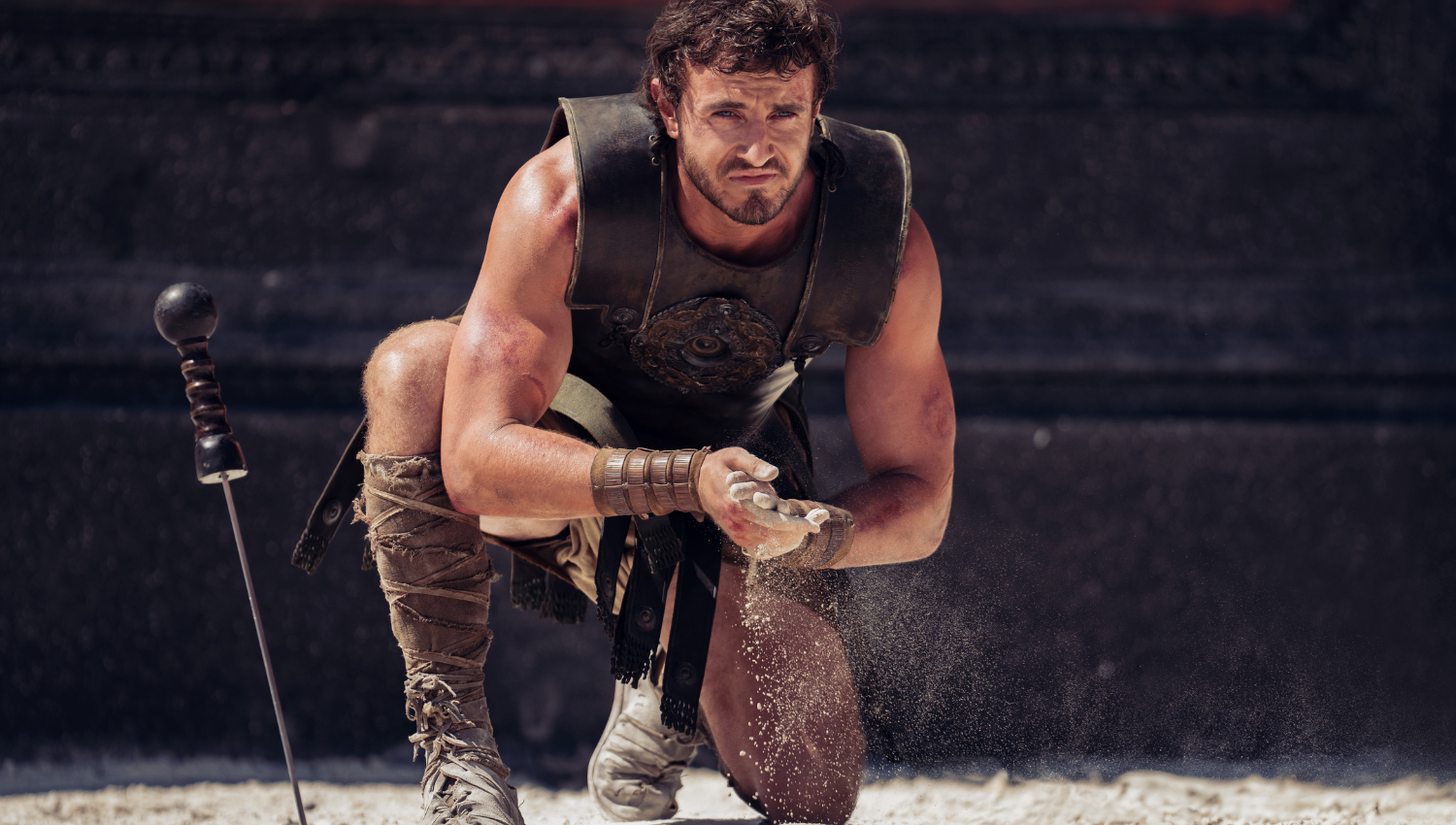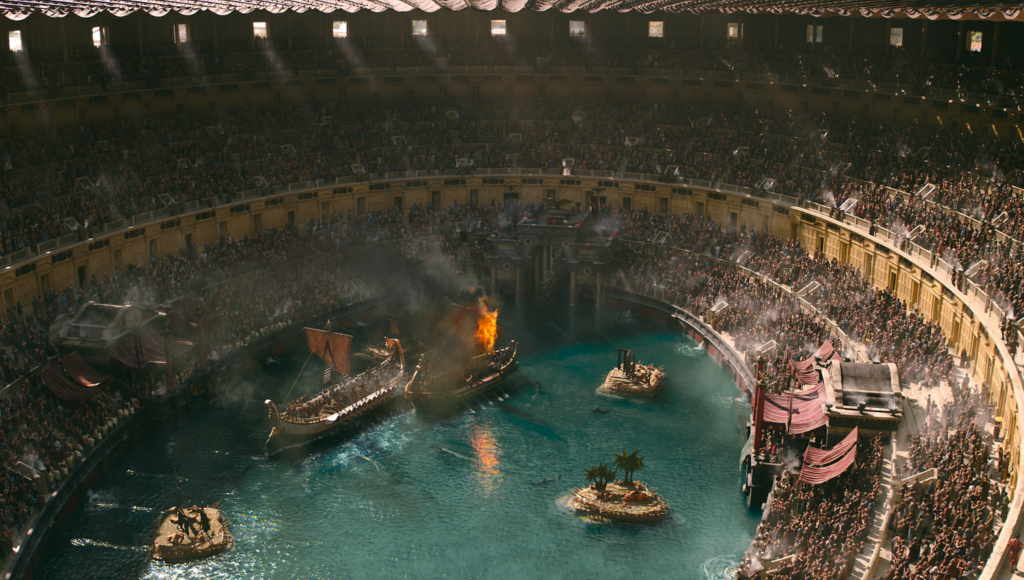
Gladiator II
Mark White
Ask anyone who is a major ‘cinephile’ or movie nerd about the biggest movies that have won an OSCAR as Best Picture, and that actually should not have, and Ridley Scott’s Gladiator most certainly enters the discussion. Bucking the trend as a major blockbuster that made massive amounts of money at the global box office to secure a nomination, Gladiator somehow got held up as Spartacus for millennials, a throwback to ‘sword and sandal’ epics of Hollywood’s golden era made by a visionary director who always has something of import to say. Fast forward two decades and Gladiator is seen as either a high-caliber version of that Hollywood epic with something to say…or as a popcorn movie with a huge budget that postures way more than it wants to admit for the sake of glory.
…so then what of the sequel? More OSCAR glory in the awards arena? Popcorn and swords and sandals and pretense?
Almost fifteen years after the gladiatorial fight between the illegitimate Emperor Commodus (Joaquin Phoenix) and the former general-turned slave and performer Maximus Decimus Meridius (Russell Crowe), Rome has slipped even further away from the ‘whispered dream’ of the republic of Marcus Aurelius (Richard Harris); as Aurelius had asked of Maximus upon his death, Maximus dies instructing that the Roman Senate step up to lead a caucus for and by the people in place of a Caesar. Instead, imperial brothers Geta and Caracalla (Joseph Quinn and Fred Hechinger) share the throne and have pushed Roman conquests as far as North Africa. The brothers’ trusted General Acacius (Pedro Pascal) has led the Roman army into Numidia, where the Numidian forces stand to protect their last free city, and fall. Among the enslaved survivors is a blue-eyed immigrant soldier (Paul Mescal) who lives among the Numidian and is broiling for revenge against the Roman general who murdered his wife and destroyed his home in the invasion. Upon arrival back in Rome, the blue-eyed man is sold to Macrinus (Denzel Washington), a charming but calculating gladiatorial-trader and gamesman with deep connections across the capital. As the brother emperors announce games and death in the Colosseum to celebrate their latest conquest, Macrinus and the blue-eyed warrior see an opportunity for revenge, political subterfuge, and a chance for power to be brokered and changed in Rome for good.
Right out the gate, the film – not to mention the zealous marketing material in the promotional run – quickly tells us (many times) that the blue-eyed warrior played by Paul Mescal is actually Lucius Verus, the son of Maximus and Lucilla (Connie Nielsen), the ‘prince of Rome’ and a legitimate claimant to the throne of the empire. Lucilla hid Lucius away in North Africa after Commodus died as the plan to reinstall the Senate was not guaranteed and that threats to Lucius as the legitimate heir to the throne could complicate the ideological return to a Republican Rome. Of course, as the Pretorian Army took control and the brothers eventually installed as leaders, the young Lucius was lost to North Africa and became like his Numidian contemporaries – very wary of Rome. But now, dragged back home and forced to face his incomplete family history and the legacy of his father, Lucius must choose between personal revenge, or the prosperity of Rome and the idea of a free democratic society.
To start with, Gladiator II is very similar – in many ways – to Gladiator. The story beats are largely the same: the film opens with Roman conquest and a battle sequence; our hero suffers a massive loss of family; our hero is then sold into slavery and made a gladiator. In fact, for those who refresh their memory of the first film prior to seeing the new one, the entirety of the sequel follows so closely to the original that the word ‘predictable’ can be used. Even with the historical research and continuity that screenwriter David Scarpa uses to advance the story of the people who actually existed at this time in Rome, the structure of the story is practically a carbon copy of the original film; perhaps it is a case of history repeating itself in many ways, but with some of the creative liberties taken with the film in some other places, perhaps a more dynamic story would have provided different stakes for the audience to engage with as Lucius returns to a collapsing Rome. But this is, after all, a Ridley Scott sword and sandals epic, so if the first one worked as it did, who is an expectant audience to turn down more of the same with history to back it up?
"Twenty years later, there is still plenty of strength and honor in the Roman Empire to fight for, only with more special effects and a more powerful focus on the need for a free Republic…and Paul Mescal’s neck muscles."
The scale is bigger here, with spectacle and size being the order of the day; Scott is eager to showcase how everything, from how the noteworthy bloat and excess of Rome was measured at this time in history, to the technological advancements of the last two decades in cinema – all of it a showcase for the visceral and tactile grandeur – the epic-ness – of Roman culture, Roman history, and the cost of all that, both as the empire it was and the empire it aspired to be. Practical scale sets for the Colosseum and the surrounding city streets are incredibly detailed; costuming is sumptuous on all characters rich or poor. The cinematography of the original has been abandoned for sleeker and longer cuts with steady camera movement that adds depth, and even better, allows for the gladiator fights – which is why so many people are paying for a ticket – to be seen in all their glory. But as with almost all modern sequels, modern CGI creeps in and… well, it does what will do in a period drama such as this: CGI beasts replace real ones, and of course, allows for an over-use of them throughout (the less said about sharks the better); CG composite shots of a recreated Roman ‘skyline’ often feels too big and too wide, and often without accurate placement of buildings to feel real. With some of the rendering feeling rushed and uneven in sequences, the CG feels noticeably out of place for a film series that is meant to be gritty and realistic in its depiction of blood and sand in the arena.
Improving over the original however, are the characters present in this Gladiator. Crowe and Phoenix elevated scant characters with gusto and layers not present in the writing in the first film, making the film much more grandiose than it is. The scripting suffers from the same problem here, with lots of perfunctory dialogue paired with visual broad strokes to give generalized characterization…on the page. Mescal, Nielsen, Pascal, and especially Washington, all put spectacular facets into their time on the screen that add dimension to these period epic stock characters. Pascal’s Acacius wears the moral decay and concerns of a Rome drunk on warfare like a badge of valor, reminding the audience that war has massive cost beyond the loss of resources or territory. Nielsen, returning from the original, portrays tragedy of lost love and lost family while carrying the hope of an ideal Rome with her over the decades. Washington – a shoe-in for supporting actor nominations (and probable wins) – is definitive as a Machiavellian wheeler and dealer with layers to his ambition that unravel as the bloodshed intensifies; the scenery chewing is gloriously deep and full of everything from personal malice to powerful hubris, and Washington reminds us all that he is one of the best actors to ever grace the screen. Last but by no means least, Paul Mescal is shouldered with the responsibility of carrying the legacy of the Oscar-winning original, as well as finding a way to separate his Lucius from Crowe’s Maximus in a way that honors what came before but stands on its own…and he succeeds beautifully. Mescal finds Lucius’ brutish rage in battle, but its the coldness in his eyes at times, or even his boyish charm in repressed, wry smiles that makes his Lucius less a war-hardened killing machine in grief, and more of a man who lost his childhood and his whole world due to the selfishness and the greed of others, and how he has been forced to fight to survive. As he recites Virgil in one scene, or reveals tidbits of his past in another, Mescal’s physicality, his cadence, and his measured tone is Maximus 2.0, but so much better. There is a poetic and tender, philosophical mind behind all the muscle that is bent to the rage – not defined by it – and Mescal carries it all well. This role may not yield awards glory for him, but Mescal will not be seen as simply an indie actor anymore; his indie edge infuses this film with the bruised heart it needs to resonate.
Ultimately, Gladiator II is a retread of what made Gladiator a rousing crowd-pleaser back in 2000. The same ideas of ‘strength and honor’, of the pillars of democracy and the man-made republic are present in both films, only this time Scott’s budget and scope are larger and more robust this time around. With more of a focus on the politics of the empire in this film, and with a cast that is simply terrific at elevating such thinly written characters, Scott’s second round in the arena somehow manages to deliver on the promise of machismo and hubris, of intrigue and catharsis that comes from these warriors with integrity, while delivering the action and violence that is promised. Perhaps more cerebral that its predecessor, Gladiator II still gives bloodshed, madness, high drama and a smattering of history, walking the line between artful history and popcorn-munching escapism. The escapism tends to win out more often than not, but when its this well made, a ‘thumbs up’ should be the final judgment from the crowd.
Final Thought
Are you not entertained?! Absolutely we are, just don’t expect Oscar glory this time; Scott needs a bit more than Mescal’s torso and stylish historical fiction to elevate this beyond quality entertainment, but it does honor - and slightly excel past - the first one.


2 thoughts on “Gladiator II”
Pingback: The History of Sound (2025) – Texas Art & Film
Pingback: 'A Road Movie of Sound, Silence, and First Love'